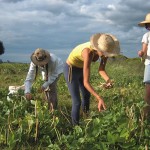Labor Farms at Risk
Post Views 0Farms are a necessary part of the circle of life. For many years youth have been helping work on farms all across America. However, youth employment laws are slowly changing the way youth can work on farms. “The Hazardous Occupations Orders for Agricultural Employment hasn’t been touched or changed for the past 40 years,” said Dee Jepsen. She is a professor in the food department at Ohio State.
There are a few exceptions in which a “young person” can work on a farm. One exception is that the farm has to be owned by the child’s parents. The second exception is when the young farm hand actually completes a safety course. The safety course is designed to help keep the youth safe while working on the farm. A lot of people may not realize the chemical and physical hazards that can develop fairly quickly while a young person is working.
Thankfully, the first exception is not changing and it will remain the same as it has always been. However, the second exception will be changing. “The second exemption is more commonly known as the tractor-safety certification program,” said Dee Jespen. “Students aged 14 and 15 would take a safety course through Extension or their high school agriculture class. There is a written exam, and skills test, where they learn about safety procedures. The certification isn’t necessarily a competency test in operating machinery.” The actual course is less than 24 hours of training to trust the youth with a machine that could take their life.
Experts want to increase this to at least 90 hours before the youth is even able to take the exam. The student would also be forced to find a “local ag” program that offers the state mandated course. Farm families can also expect a few other types of legislation to be put into place to keep the farming youth safe from harm. The big age cut-off is 16 for most farm work related to machinery.
Other Changes
Youth and farm work is not the only thing experiencing changes. Livestock changes are also in the mend. Jespen also exposed some other changes expecting to happen. The rules were pretty basic when youth were working with life stock but now they are changing.
“They’ve expanded that to say that students can’t work with any animal husbandry practice like breeding, branding, dehorning or treating sick animals,” she said. “They aren’t allowed to catch chickens in preparation for market, and they can’t herd animals in confined spaces or on horseback or using ATVs or other motorized vehicles.” This is a very large move because a lot of people depend on youth to help run the farms. What about programs like 4H? There should be no panic happening in the farming community but people should be complying with these changes.
Labor Farms at Risk by Harrison Barnes



 Top Canadian Companies You Want to Work For
Top Canadian Companies You Want to Work For  Chicago’s Top Tech Companies
Chicago’s Top Tech Companies  Atlanta’s Top Telecom, Cell Phone, and Electronics Manufacturers
Atlanta’s Top Telecom, Cell Phone, and Electronics Manufacturers  Amazon May Have a Better Grasp on Workplace Culture
Amazon May Have a Better Grasp on Workplace Culture  Expected Changes in 2016 to the Workplace
Expected Changes in 2016 to the Workplace